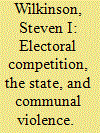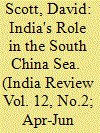|
|
|
Sort Order |
|
|
|
Items / Page
|
|
|
|
|
|
|
| Srl | Item |
| 1 |
ID:
121402


|
|
|
|
|
| Publication |
2013.
|
| Summary/Abstract |
In a review of my 2004 book Votes and Violence,Ashutosh Varshney and Joshua Gubler criticize various aspects of the book and its electoral incentives theory. The implication is that Varshney's own local civic engagement theory provides a superior explanation for communal violence. This article responds to the specific criticisms of my arguments about the role of electoral incentives and state action, or inaction, in leading to communal violence, showing why these are wrong or unimportant. I cite three important recent studies, by scholars working independently of me, who come to the same conclusions I do about the key role of electoral incentives and the importance of the state. I also cite the work of other scholars, based on careful fieldwork, who have questioned Varshney's characterization of the causes of conflict and peace in the cities he discusses in his own 2002 book Ethnic Conflict and Civic Life.
|
|
|
|
|
|
|
|
|
|
|
|
|
|
|
|
| 2 |
ID:
121400


|
|
|
|
|
| Publication |
2013.
|
| Summary/Abstract |
This article looks at the South China Sea, an area of dispute between China and other littoral states, as a new area of geopolitical and geoeconomic interest for India. The article follows the strategic discourse on the South China Sea circulating in the Indian government and wider strategic community, and brings in Chinese responses and interpretations of India's involvement. India's role in the South China Sea is four-fold: first, naval deployments; second, increasing strategic-military links with littoral states like Singapore, Indonesia, the Philippines, and Vietnam; third, economic involvement of Indian energy companies in South China Sea waters; and fourth, discussions between India and other regional and extra-regional China-concerned powers about the South China Sea. India's involvement in the South China Sea represents a new development in its Look East Policy, a new balancing factor in the interplay of actors within these waters, and a new friction factor within India-China relations.
|
|
|
|
|
|
|
|
|
|
|
|
|
|
|
|
| 3 |
ID:
121401


|
|
|
|
|
| Publication |
2013.
|
| Summary/Abstract |
A theory of public action will be a sociological one, for it can explain the activities of different individual stakeholders who are both driven by varied motives and interests and are required to come together for achieving some avowedly public objective. On the basis of a review of scholarly literature and three case studies of public action (based on ethnographic fieldwork) in an Indian village, this study observes that public action is far more complex than celebrated problems of collective action. In public action we want collective action to happen and deliver optimum outputs for target publics. But this should at the same time offer gains, rewards, and outcomes of different kinds to different stakeholders. This discussion aims to outline the scope and possible types of public action. Such a discussion has important implications, for policy as public action should be designed adequately as collective action with differential rewards in place for participants.
|
|
|
|
|
|
|
|
|
|
|
|
|
|
|
|
|
|
|
|
|